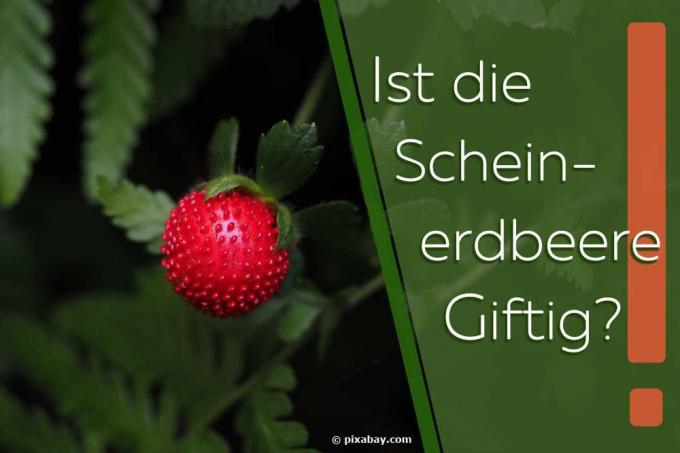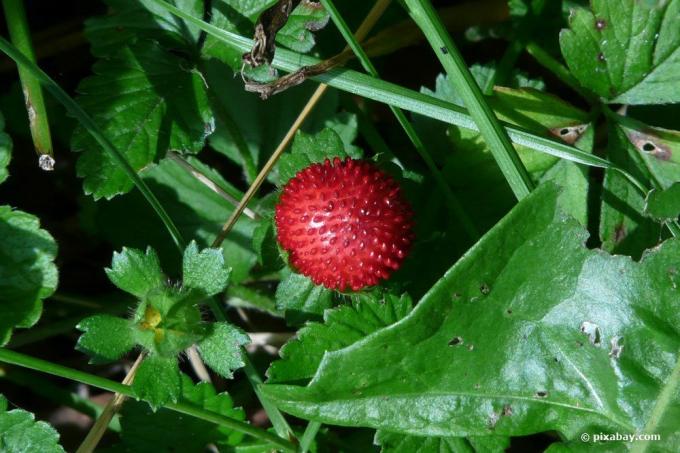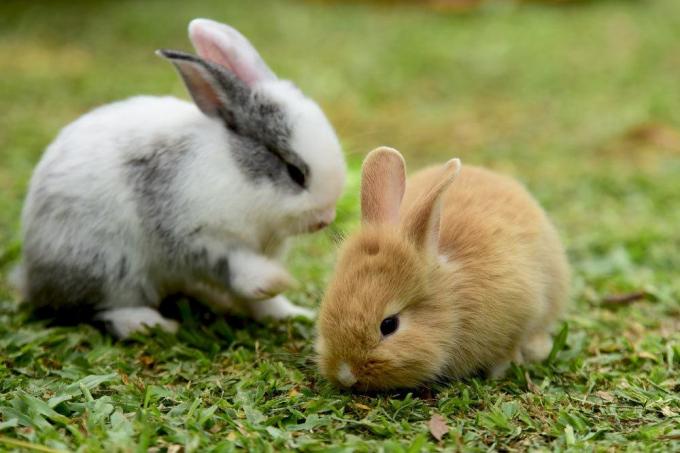
table of contents
- Mock strawberries: poisonous or not?
- Effect on animals
- dogs
- Cats
- Small animals
- Birds
The Indian mock strawberry is a popular ornamental plant that looks very similar to the local strawberry at first glance. Nevertheless, the two plants show a significant difference by which they can be recognized. Mock strawberries grow with the fruit up, while strawberries hang down. As it is at Potentilla indica is an ornamental plant, the question often arises whether it is poisonous.
Mock strawberries: poisonous or not?
If you are not sure whether the dummy strawberry compares to the domestic strawberries (bot. Fragaria) is poisonous, you can sit back and relax. Despite the name, Duchesnea indica is a false strawberry not poisonous, which can be recognized by the ingredients that are formed in the parts of the plant:
- Ascorbic acid
- Beta amyrin
- Daucosterol
- Fumaric acid
- Ellagic acid
- Lupeol
- B-sitosterol
- Ursolic acid
- vitamin C
- Minerals: calcium, magnesium, phosphorus, iron, potassium
Because of its ingredients, the Mock Strawberry is an effective addition to your own diet, as long as you can endure the bitter taste. Children in particular are enthusiastic about the strawberries at the beginning until they have tasted them once. The good thing: Despite the bitter taste, there is no poisoning after consumption, no matter which plant parts of the species. Even children, sick or weak people can handle or consume the plant without hesitation. Potentilla indica has the following properties on the body:
- antiseptic
- anticoagulant
- detoxifying
- cleansing
- fever lowering
The plant is part of Chinese folk medicine and is prepared there in many ways. Even wild specimens, as they are more and more common in Germany and Central Europe, do not pose a threat to humans.

tip: You should be careful when consuming the dummy strawberries if you are allergic to strawberries or rose plants (bot. Rosaceae) in general. In addition to strawberries, these include plums, almonds, rose hips, cherries or raspberries, which in the worst case can even lead to anaphylactic shock.
Effect on animals
dogs
Because of the ingredients, dogs are protected from possible poisoning by the mock strawberry. The animals can easily eat large quantities of all parts of the plant without suffering any side effects, which makes them a safe ornamental plant in the garden or in the tub. Even puppies do not need to be watched when they are near the plant. However, if your puppy is playing with one of the fruits, you should be careful not to choke the animal. Fake strawberries aren't necessarily small and can quickly get stuck in your throat if you're not careful in the heat of the moment. If your dogs love to dig, you don't have to worry about poisoning either. The roots pose no threat to man's best friend.
Note: If you are a horse owner, you don't need to worry about the potential toxicity or hazards associated with the Indian mock strawberry. Horses can even find some of the plants wild and they are seen as a snack that is eaten in between meals.
Cats
As pets, cats are much more at risk when it comes to poisonous indoor or garden plants. The reason for this is the poor sense of smell and taste of the velvet paws. They check their surroundings mainly by chewing on plants and can quickly become poisoned in this way. Fortunately, with Potentilla indica, that concern is completely unfounded because it is not poisonous for cats. The house tigers are allowed to eat the plant as much as they want, even after large quantities there are no problems. Just make sure that your animals don't eat too much of the berries as the acidity is quite high. In the long run, this can lead to acidity and stomach problems. Fake strawberries are rarely eaten by cats, as they are quite unattractive to them.
Small animals
Even for small animals, Potentilla indica is completely harmless and can even establish itself as a snack. It is mainly local small animals that are happy about the plant:
- Rabbits
- Rabbits
- hamster
- Mice
- Rats
- Hedgehog

Animals like guinea pigs and chinchillas, which come from South America, are usually less fond of the pseudo strawberry. You can feed not only the berries, but the whole plant including the roots. Rabbits are more likely to feed on the leaves in the wild when you encounter the plant, as the plant is completely non-toxic. For this reason, the pseudo strawberry can even be used as a non-hazardous source of food for your small animals to use. As with cats, you should keep the amount of berries fed to you to avoid stomach discomfort from excessive acid. But you can feed some of the berries in between.
Birds
If you keep mock strawberries with birds, you can even use the fruit as a feed additive. A small number of the berries can be administered without any problems, as they have a similar effect on the organism of the animals as the domestic strawberries. But don't be surprised if your birds don't really care about fake strawberries. Because of their bitter taste, they are very uninteresting and not even eaten in nature. Exceptions are usually low levels of food in the area. But there is nothing against feeding your flying pets from the annual harvest.
Note: Please note that this article does not in any way replace a visit to the doctor. There is no guarantee that medical statements are correct.
You will find detailed information on first aid in the event of poisoning and important information on poison control centers here.



